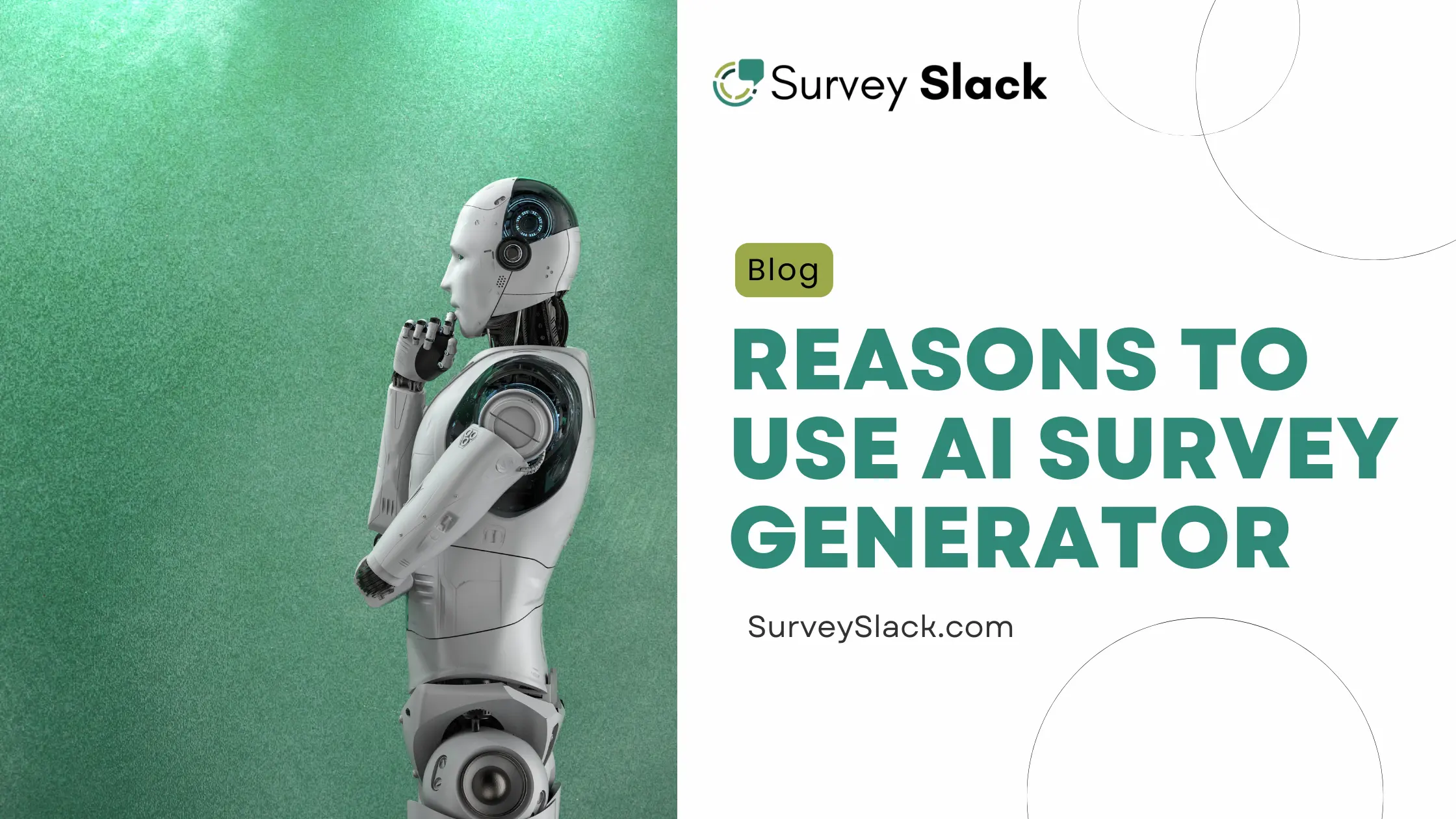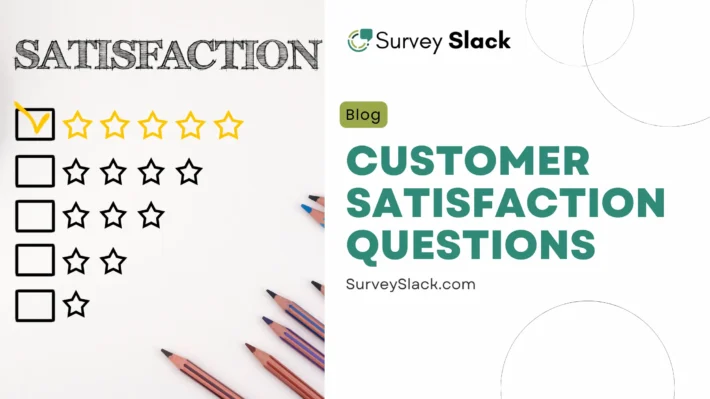5 Reasons Why You Need a Question AI Survey Generator in Your Research

Surveys are crucial for research, providing insights into human behavior and opinions. However, they can be complex and time-consuming, with issues like biased question framing and response fatigue. Leveraging an AI Survey Generator increases productivity, optimizing survey design for insightful responses, saving time, and enhancing efficiency.
These generators offer increased efficiency and improved data quality, enhancing the impact and reliability of research endeavors.
Integrating the AI survey into research methodology is essential for unlocking the full potential of survey-based investigations.
Table of Contents:
- Reason 1: Save Time and Effort
- Reason 2: Improve Question Quality
- Reason 3: Enhance Survey Design
- Reason 4: Increase Response Rates
- Reason 5: Reduce Bias and Error
Engage with Interactive Surveys
Make surveys fun and engaging
Reason 1: Save Time and Effort
- An AI survey generator is a crucial tool in research, especially in question formation. It streamlines the process by using automated algorithms to analyze research objectives, target audience, and desired outcomes.
- This results in tailored questions with minimal human intervention. The primary advantage of using it is the time saved in the initial research phases, as manual research and brainstorming can be time-consuming and prone to errors.
- This allows researchers to focus on more strategic aspects of the study, such as data analysis and interpretation.
Feature List:
- AI survey generator can automatically generate a diverse set of questions based on predefined criteria, significantly reducing the time spent manually crafting surveys.
- These tools often come equipped with customizable templates that can be tailored to suit specific research objectives, enabling researchers to create surveys with minimal effort.
- AI algorithms can optimize the flow of surveys by intelligently sequencing questions and adjusting the pace based on respondent engagement, ensuring a streamlined and efficient data collection process.
Pros:
- Efficiency: To significantly reduce the time required for question creation, enabling researchers to focus on more critical aspects of their study.
- Consistency: Automated algorithms ensure consistency in question formulation, minimizing the risk of biased or uneven structures.
- Customization: Many survey maker allow customization based on specific research objectives, tailoring the questions to suit the unique needs of each study.
- Adaptability: These tools can adapt to evolving research requirements, accommodating changes in real-time without extensive manual rework.
- Enhanced Question Quality: AI algorithms can analyze existing datasets and research trends, contributing to the creation of high-quality questions that align with current standards.
Cons:
- Learning Curve: Some researchers may face a learning curve when adapting to the survey tool, potentially slowing down the initial implementation.
- Limited Creativity: While efficient, AI generators may lack the creative insight that a human mind can provide, potentially leading to less imaginative or contextually nuanced questions.
- Dependency on Data Quality: The effectiveness of AI survey generators is contingent upon the quality and relevance of the input data, and inadequate data may result in suboptimal question generation.
Also, Read:
Reason 2: Improve Question Quality
While creating surveys can be a crucial part of research, it can also be time-consuming and challenging. AI survey generator can offer a valuable solution, streamlining the process and potentially improving your research outcomes.
Here are five reasons why you should consider using one:
Feature List:
- Natural Language Processing (NLP): To leverage advanced NLP algorithms to understand the nuances of language. This enables them to generate questions that are accurate and contextually relevant.
- Bias Detection and Reduction: These tools are equipped with the capability to identify and mitigate biases in survey questions. By analyzing the phrasing and structure, the AI survey tool helps researchers create questions that are neutral and free from potential biases.
- Adaptive Questioning: The AI system adapts to user inputs and refines questions based on the specific characteristics of the target audience. This ensures that questions are tailored to the respondents’ background, making them more comprehensible and relatable.
- Multilingual Support: Thus you can overcome language barriers by providing accurate translations and ensuring that questions maintain their intended meaning across different languages. This feature is especially beneficial for global research projects.
- Feedback Mechanism: Incorporating a feedback loop, these tools allow researchers to receive instant insights into the effectiveness of their questions. This iterative process enables continuous improvement and refinement of online survey questions over time.
Pros:
- Enhanced Clarity: AI-generated questions tend to be clearer and more concise, reducing the likelihood of misinterpretation by respondents.
- Time Efficiency: The automation of question generation streamlines the research process, saving researchers considerable time that can be allocated to data analysis and interpretation.
- Consistency: AI ensures consistency in question formulation, preventing variations that might occur when different individuals create survey questions manually.
- Customization: Researchers can customize the level of complexity, formality, or simplicity in questions to match the characteristics of their target audience.
- Increased Objectivity: By identifying and rectifying potential biases, AI survey generators contribute to the production of more objective and unbiased questions.
Cons:
- Initial Learning Curve: Users may face a learning curve in understanding and effectively utilizing an AI survey generator, particularly if they are new to the technology.
- Limited Context Sensitivity: While AI is adept at language processing, it may still struggle with certain context-specific nuances, requiring manual oversight in some cases.
- Dependency on Data Quality: The effectiveness heavily relies on the quality of the input data. Inaccuracies in the data may result in suboptimal question generation.
- Lack of Intuition: AI lacks human intuition, which means it may not fully grasp the subtleties of certain research topics or cultural nuances.
- Cost Considerations: Some advanced AI survey generators may come with a cost, and the investment should be weighed against the specific needs and budget constraints of the research project.
Reason 3: Enhance Survey Design
Incorporating it into your research survey can significantly enhance the overall design of your surveys, leading to more robust and effective data collection. Here’s a breakdown of the features, pros, and cons associated with this aspect:
Feature List:
- Customization Options: Generators often offer a wide range of customization options, allowing researchers to tailor surveys to their specific needs. This includes the ability to choose question types, design layouts, and personalize the overall look and feel.
- Smart Question Recommendations: These generators leverage machine learning algorithms to provide intelligent question recommendations based on the study’s objectives. This ensures that includes relevant and insightful questions, improving the overall quality of data collected.
- Adaptive Surveys: AI-driven tools can dynamically adjust paths in survey maker based on respondents’ previous answers. This adaptive feature helps in creating a more engaging and personalized experience for participants, ensuring that they only encounter questions relevant to their previous responses.
- Aesthetically Pleasing Designs: Many Generators offer pre-designed templates and themes that are visually appealing. This not only makes the survey-taking experience more enjoyable for participants but also contributes to higher response rates.
- Mobile Optimization: With the prevalence of mobile devices, AI Survey Generator often come with built-in mobile optimization features. Surveys are designed to be responsive and user-friendly on various screen sizes, ensuring that respondents can participate seamlessly on smartphones and tablets.
Pros:
- Increased Engagement: A well-designed survey can capture and maintain respondents’ attention, leading to higher completion rates. This is particularly crucial for obtaining comprehensive and representative data.
- Improved Data Quality: Smart question recommendations and adaptive surveys help in reducing irrelevant or redundant questions. This not only streamlines the process but also enhances the accuracy and reliability of the collected data.
- Enhanced Brand Perception: Professional and aesthetically pleasing designs contribute to a positive brand image. Respondents are more likely to view the research as reputable and legitimate when presented with well-crafted surveys.
- Time and Cost Efficiency: The AI Survey tool automates the design process, saving researchers valuable time that would otherwise be spent on manual formatting. This efficiency translates to cost savings and allows researchers to focus on the analysis and interpretation of results.
- Greater Flexibility: The customization options are provided by offering researchers greater flexibility in adapting surveys to various research contexts and target audiences.
Cons:
- Learning Curve: Implementing new technology may require researchers to invest time in learning how to effectively use the generator especially if they are not familiar with such tools.
- Dependence on Technology: Relying solely on AI for design may lead to a lack of personal touch. Researchers should balance automation with a thoughtful, human-centric approach to ensure the surveys meet the unique requirements of the study.
- Limited Creativity: While AI tools offer customization options, there might be limitations in terms of creativity and out-of-the-box design. Researchers may need to find a balance between automated features and manual customization to achieve the desired level of creativity in their surveys.
Also, Read:
Reason 4: Increase Response Rates
To achieve high response rates is often a crucial determinant of the study’s success. Traditional methods may struggle to engage participants effectively, leading to lower response rates. Here’s why incorporating an AI Survey Generator can significantly boost response rates:
Feature List:
- Personalized Content: To craft personalized content based on individual respondent characteristics. By tailoring questions to match the respondent’s profile or previous responses, the survey becomes more engaging and relevant. Personalization has been shown to capture respondents’ attention and encourage them to complete the survey, ultimately leading to higher response rates.
- Real-time Feedback and Guidance: These AI tools often provide real-time feedback to participants as they progress through the survey. Instant feedback can motivate respondents by assuring them of the survey’s relevance and importance. Additionally, In survey maker AI-generated guidance can help clarify questions or offer additional information, reducing confusion and making the experience more user-friendly.
- Adaptive Questioning: To dynamically adjust the survey flow based on respondents’ previous answers. This adaptive questioning ensures that participants are directed toward questions that are most pertinent to their experiences or opinions. By avoiding irrelevant questions, respondents are more likely to stay engaged and complete the survey, contributing to increased response rates.
- Multichannel Distribution: Survey often supports the distribution of surveys across various channels, including email, social media, and embedded links. This multichannel approach widens the reach of the survey, making it more accessible to a diverse audience. As respondents can choose the platform that suits them best, the likelihood of participation increases, positively impacting response rates.
- Automated Reminders: One common reason for low response rates is respondents forgetting to complete the survey. AI Survey Generators can automate reminder messages at strategic intervals, gently nudging participants to finish the survey. Timely reminders can significantly improve response rates by keeping in the participants’ minds and encouraging them to complete it promptly.
Pros:
- Efficiency: To streamline the survey creation process, allowing researchers to generate comprehensive and effective surveys quickly. This efficiency is beneficial for time-sensitive projects and large-scale studies.
- Enhanced Data Quality: Personalization and adaptive questioning contribute to better data quality as respondents are more likely to provide accurate and thoughtful responses. This improves the reliability and validity of the research findings.
- Cost-Effective: While there may be initial setup costs, Online Survey Generators can be cost-effective in the long run by reducing the need for manual design, distribution, and analysis. This is especially true for researchers conducting multiple surveys or longitudinal studies.
Cons:
- Initial Learning Curve: Users may experience a learning curve when adopting an AI Survey tool. Training and familiarity with the platform are necessary to fully harness its capabilities.
- Dependency on Technology: Relying on AI for survey generation may make researchers dependent on technology, and technical issues or system malfunctions could potentially disrupt the process.
Also, Read:
Reason 5: Reduce Bias and Error
While AI Survey Generators is a valuable tools for reducing bias and error in research, users must carefully consider the pros and cons to maximize their benefits and mitigate potential drawbacks.
Feature List:
- Algorithmic Question Design: Surveys employ algorithms that automatically design unbiased and well-structured questions, ensuring that the content is free from inherent biases.
- Diverse Language Models: These tools often incorporate diverse language models, enabling researchers to create surveys that resonate with a broad range of respondents. This helps in eliminating linguistic biases that may arise from using a limited set of phrases.
- Response Analysis: AI-driven survey maker come equipped with advanced analytics capabilities, allowing for real-time analysis of responses. This feature helps in identifying and rectifying any inadvertent biases that may emerge during the process.
- Demographic Considerations: The AI algorithms consider demographic factors and tailor questions accordingly, ensuring that questions are relevant and culturally sensitive to diverse groups of participants.
- Randomization Techniques: To counteract order effects and response biases, AI Survey tool often incorporate randomization techniques, presenting questions and answer options in a randomized order to different respondents.
Pros:
- Enhanced Objectivity: Generators can design surveys with a higher degree of objectivity, reducing the influence of subjective biases that human designers may unintentionally introduce.
- Efficient Analysis: The real-time analysis capabilities streamline the identification of potential biases or errors, allowing researchers to make prompt adjustments during the administration.
- Increased Consistency: By relying on algorithms, AI survey generator ensure a consistent approach to question design and delivery, reducing variations that may lead to biased results.
- Adaptability to Feedback: These tools can adapt and learn from feedback, continuously improving their question-generation algorithms to enhance accuracy and reduce bias over time.
- Time and Cost Efficiency: The automation of survey design and analysis processes can save considerable time and resources, enabling researchers to focus on interpreting results and drawing meaningful conclusions.
Cons:
- Initial Learning Curve: Users may face a learning curve while familiarizing themselves with the Survey interface and functionalities.
- Dependency on Data Quality: The effectiveness of these tools relies on the quality of input data. If the initial data used for training the AI model contains biases, the generated surveys may still reflect those biases.
- Lack of Human Intuition: While algorithms can reduce bias to a great extent, they may lack the nuanced understanding and intuition that a human researcher possesses, potentially leading to oversights in design.
- Limited Contextual Understanding: AI Survey Generators may struggle to grasp the broader contextual nuances of certain questions, leading to potential misinterpretation.
- Ethical Considerations: This raises ethical considerations, such as transparency, consent, and the responsible use of participant data, which need to be addressed diligently.
Increase Response Rates
Optimize surveys for higher engagement
Conclusion:
In Conclusion, AI survey generator offers researchers significant advantages, such as time and effort savings, improved question quality, and enhanced survey design. This can lead to increased response rates and reduced bias in data.
However, it’s crucial to recognize that AI is a tool with limitations, and researchers should use their judgment when interpreting generated content. Despite these limitations, AI survey tool are undeniably beneficial for research efficiency.
Frequently asked question(FAQs):
What is an AI survey generator?
An AI survey generator is a software tool that utilizes artificial intelligence to assist you in creating and improving your surveys. It can help generate relevant questions, optimize question wording, and even prevent bias in your surveys.
How can an AI survey generator benefit my research?
AI survey generators can save you time and effort in crafting surveys, improve the quality of your questions, enhance the design and flow of your survey, potentially increase response rates, and help reduce bias and errors in your data collection.
Are AI survey generators completely reliable?
While AI offers valuable assistance, it’s important to remember that it’s a tool, not a replacement for human expertise and judgment. Reviewing and editing AI-generated content to ensure its accuracy and alignment with your research goals is crucial.
Is it difficult to use an AI survey generator?
Most AI survey generators are user-friendly and designed to be accessible even for those with no prior experience. They often offer intuitive interfaces and clear instructions to guide you through the process.
What are some things to consider when choosing an AI survey generator?
Look for features that align with your research needs, such as specific question types, language support, data analysis integration, and pricing models. Consider reading reviews and comparing different options before making your decision.





